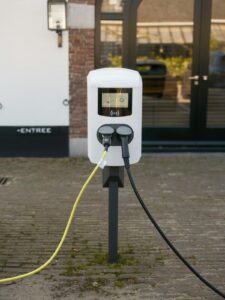
Home / EV Charging News / The Impact of Electric Cars on Energy Demand: Exploring the potential impact of widespread electric vehicle adoption on the electrical grid and energy markets
Electric vehicles (EVs) have gained popularity in recent years as a cleaner alternative to traditional gasoline-powered cars. The growth in electric vehicle adoption has been fueled by government incentives, falling battery prices, and improved charging infrastructure. However, the widespread adoption of electric vehicles may have significant implications for the electrical grid and energy markets. This article explores the potential impact of electric vehicle adoption on energy demand, the electrical grid, and energy markets.
Electric vehicles require electricity to charge their batteries. As such, the widespread adoption of electric vehicles would lead to an increase in energy demand. According to the International Energy Agency (IEA), the number of electric vehicles on the road is expected to reach 145 million by 2030, up from just 3 million in 2017. This increase in electric vehicle adoption could lead to a significant increase in energy demand.
The widespread adoption of electric vehicles could also have an impact on the electrical grid. As more people switch to electric vehicles, there will be an increase in demand for charging infrastructure. This increased demand could put a strain on the electrical grid, especially during peak charging periods. To meet this increased demand, utilities may need to upgrade the electrical grid, install additional charging infrastructure, and implement smart grid technologies to manage charging demand.
The adoption of electric vehicles could also have significant implications for energy markets. With the increase in demand for electricity, there may be a shift in the sources of energy used to generate electricity. Renewable energy sources such as wind and solar could become more important as a way to meet the increased demand for electricity. Additionally, the adoption of electric vehicles could lead to a shift in the demand for fossil fuels. As electric vehicles become more popular, the demand for gasoline and diesel may decrease, leading to a shift in the oil market.
Another potential impact on energy markets is the creation of new business models. Electric vehicle charging infrastructure providers, for example, could become an important player in the energy markets. They could leverage their charging infrastructure to offer additional services such as energy storage, demand response, and vehicle-to-grid services.
The widespread adoption of electric vehicles raises important policy questions. Governments may need to consider policies to promote the deployment of charging infrastructure, incentivize the adoption of electric vehicles, and manage the impact on the electrical grid. They may also need to consider policies to support the development of renewable energy sources and the transition away from fossil fuels.
Despite the potential benefits, there are still challenges to widespread electric vehicle adoption. One of the biggest challenges is the cost of electric vehicles. While the cost of batteries has fallen significantly in recent years, electric vehicles are still generally more expensive than their gasoline-powered counterparts. This can be a barrier for many consumers, especially those in low-income communities.
Another challenge is the lack of charging infrastructure. Many consumers are hesitant to buy electric vehicles because of concerns about range anxiety and the availability of charging stations. Addressing this issue will require significant investments in charging infrastructure, especially in public areas such as highways, cities, and workplaces.
Finally, the transition to electric vehicles could also have an impact on jobs in the traditional automotive industry. As electric vehicles become more popular, there may be a decline in the demand for gasoline-powered vehicles, which could lead to job losses in the manufacturing and servicing of traditional vehicles.
The widespread adoption of electric vehicles has the potential to transform the energy and transportation sectors, but it also presents significant challenges. Policymakers and industry stakeholders will need to work together to address these challenges and ensure a sustainable transition to a cleaner transportation future. By investing in charging infrastructure, promoting the adoption of electric vehicles, and supporting the development of renewable energy sources, we can create a more sustainable and prosperous future for all.
$2,890.00 Original price was: $2,890.00.$2,790.00Current price is: $2,790.00.
$3,950.00 Original price was: $3,950.00.$3,450.00Current price is: $3,450.00.
$1,650.00 Original price was: $1,650.00.$1,590.00Current price is: $1,590.00.
$2,290.00 Original price was: $2,290.00.$2,150.00Current price is: $2,150.00.
$1,290.00 Original price was: $1,290.00.$799.00Current price is: $799.00.

Your Power Management Partner for Over 25 Years Future Generations Depend on Our Decisions Today ™
2024 © All rights reserved by CyberSwitching